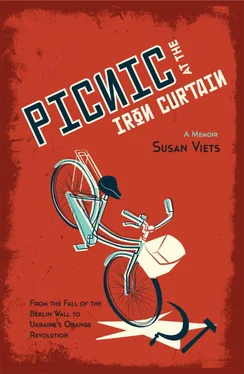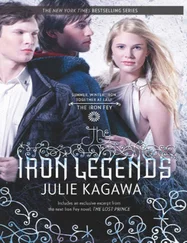The light socket in the archway leading into the courtyard had no bulb. “They’re always stolen,” Yaroslav explained. Then he warned me to watch out for a large pothole that I could not see for lack of light. It was even darker inside the building. I dragged my hand along the wall to guide myself down the hallway. Once inside the apartment Yaroslav flicked a switch. “They mix chalk with the paint,” Yaroslav said. “Don’t lean against any of the painted walls unless you want your clothes to turn blue.”
The apartment was dingy, with peeling wallpaper in the living room. However, it was well situated. Yaroslav explained that I could walk to the city centre from here. I thanked him for his help, then he left. I unpacked several rolls of Hungarian salami and smoked cheese and cartons of juice. The fridge did not work, so I stacked the food in the kitchen cupboard. I picked up the telephone receiver. I heard a dial tone. I went to bed, satisfied that I had a functioning phone. The next day I began my descent into paranoia.
In the morning I had an appointment to meet Yaroslav at the Rukh headquarters, near Parliament. I looked forward to this meeting as an opportunity to learn more about the organization’s political manifesto. Rukh fought for independence, but I had not been able to uncover its plan for governing if this goal were achieved. All the political propaganda stressed the republic’s wealth as the breadbasket of Europe, but said nothing about energy poverty that left it totally reliant on Russian oil and gas imports. I also wondered what Rukh’s plan was for Ukraine’s share of the Soviet nuclear arsenal and whether it would shut the Chernobyl nuclear power plant that had caught fire and exploded with such devastating consequences four years earlier, in 1986. At that time I had sat in my parents’ den in Ottawa watching television news reports as neighbouring countries began to detect clouds of radiation and raised the alarm.
I walked down Khreshchatyk Avenue, past the Dnipro Hotel, to the Rukh office. I stopped to use a bathroom along the way. I opened the cubicle door and faced a cracked, stained toilet bowl with no seat. The floor seemed worryingly slick. A small plastic container mounted crookedly on the wall contained torn bits of newspaper instead of toilet paper. I felt certain that cholera lurked in the cubicle. I soon learned that when nature called it was best to take the tram to Parliament and use the clean bathroom there.
I entered the Rukh office and saw Yaroslav, who was busy at the fax machine, sending out his latest edition of the news. A tall, slender student, with the prominent cheekbones of a model, counted megaphones. The student locked the megaphones away in a cupboard and then turned and introduced himself. “Sashko,” he said. “Those are our most important weapon,” he added, gesturing toward the cupboard with the megaphones. Soon older members who led the organization arrived.
They welcomed me to Ukraine and showed me a desk where I could work. I did not speak Ukrainian, so I chatted in Russian, asked my questions but realized from the answers that no detailed policy platform existed yet. I thanked the Rukh leaders for their hospitality. I sensed tension and unease throughout the conversation. When the older men left I asked Yaroslav what I had done to offend them.
“It’s the language,” he said. “Some of them spent years in labour camps for writing poems or singing songs in Ukrainian. They’ve paid quite a price to keep the language alive.”
I had studied Russian and Soviet history for five years and knew none of this. My crash course in history from the Ukrainian perspective had begun. I felt a sense of déjà vu from Budapest. I would not be able to speak Russian here and would need to hire a Ukrainian interpreter. In the meantime I sat at my desk and kept my mouth shut. Yaroslav told me that one leader asked him if I was nashyi [ours].
“What does that mean?”
“Whether you’re with us or against us.”
This was the language of war. I felt upset to be viewed with suspicion and also by such extremes that allowed for no middle ground as an impartial observer. I realized too that this situation was my own fault. A Rukh-sponsored visa came with expectations. I would need to break the tie to maintain independence. I was beginning to feel very alone in Kiev. In this city I had no family members, friends or colleagues, and knew no one of common nationality or mindset. For the first time I began to understand what it meant to be an alien. This struggle was about the right to exist as a Ukrainian and I was not one, so I almost did not count. I sat quietly in the office and listened closely to Ukrainian chatter around me, hopeful that I might soon absorb the language, or somehow feel more at home. Around noon I turned my attention to a new set of concerns.
I had a meeting scheduled that afternoon at the Foreign Ministry press centre with Mr. C. and Mr. I. We had met in March, when I requested accreditation. I had spoken Russian there and no one seemed to mind. What troubled me was that I could not think of a good excuse to explain why I had arrived on a Rukh-sponsored visa, instead of waiting for government papers. Since I spoke poor Russian, perhaps I could play dumb and attribute the change of plans to a language misunderstanding. Something about Ukraine was turning me into a child prepared to tell any story to avoid getting in trouble. I would not behave this way at home.
I left the Rukh headquarters and walked up the hill toward Parliament. A wooded park, at the top of an embankment, ran alongside the road. The Foreign Ministry press centre was situated on a side street lined with trees, in a low rise nineteenth-century stone building painted pale yellow. A decorative knee-high metal fence ran along the front of the building. Flat oval-shaped street lamps hung from wires strung across the road. I did not know what to expect from the meeting, so I dreaded going in. I stood on the sidewalk and procrastinated a while. I stared at attractive brick apartment blocks across the road and wondered who lived inside. The buildings had bay windows and balconies made from finely wrought metal work. They were designed with care. Then I stepped up to the main entrance and into the press office.
Mr. C. and Mr. I. shared the office. Each sat at his own desk. Mr. C. was small, greying and stout. Mr. I. was large and imposing with jet black hair and big teeth. We chatted politely. They inquired about my trip. Then I gave them the letter from my editor (I now worked for the Independent ) formally requesting press accreditation in Ukraine that had already been faxed to them at least a dozen times.
Mr. I. took the letter. He said, “ Solnyshko , we will do what we can to help you but you are operating in a grey zone.” He lectured me, alluding to the fact that I had made a mistake by coming to Kiev on a Rukh-sponsored visa, though never saying this outright. He ended by calling me solnyshko again, which means “sunshine.” I was encouraged by solnyshko and even happier when I saw Mr. C. take a parliamentary press pass from his desk drawer and write my name on it. I felt so relieved. I was not accredited yet but a parliamentary pass meant that I would have freedom to work in Kiev.
“You will move into a foreigners’ compound when you are accredited, just like the ones in Moscow,” Mr. C. said. “We hope you will be the first swallow of the new season.”
It surprised me that Kiev had a foreigners’ compound because as far as I knew no other Westerners lived in the city other than a French consul general and a German consul general, both of whom had their own residences. I asked where the compound was located.
“It doesn’t exist yet,” said Mr. C., “but we will build one.”
Читать дальше












